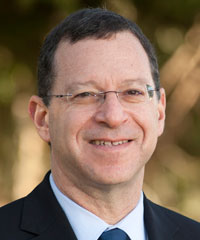Harris is Vice Chancellor for Research, Professor of Evolution and Ecology and the Robert and Rosabel Osborne Endowed Chair at the University of California, Davis. Prior to his appointment at UC Davis, Lewin spent 27 years at the University of Illinois, where he was the E.W. and J.M. Gutgsell Endowed Professor of Immunogenetics. Lewin served as Director of the University of Illinois Biotechnology Center, Founding Director of the W. M. Keck Center for Comparative and Functional Genomics, and Founding Director of the Institute for Genomic Biology.
Professor Lewin’s current research interest is in mammalian comparative and functional genomics. He and his team are studying how mammalian genomes evolve and the role of chromosome rearrangements in adaptation, speciation and the origins of cancer. Lewin’s research led to the identification of a gene responsible for resistance and susceptibility to bovine leukemia virus infection, the development of high-density comparative maps for mammalian genomes, and co-discovery of a gene affecting milk fat composition. In addition, his group produced the first large-scale cattle cDNA and oligo microarrays, which he and his collaborators have used to study the genomic effects of nuclear transfer cloning, the development and involution of the mammary gland, and the dietary effects on gene expression during the periparturient period.
Lewin is Founding co-Editor of Annual Reviews of Animal and Veterinary Biosciences, Associate Editor of the journal Animal Biotechnology and has served on the Editorial Board of Physiological Genomics and Annual Reviews of Genomics and Human Genetics. In 2004, he was elected as a Fellow of the American Association for the Advancement of Science and in 2007 he was elected as a foreign member of the Royal Swedish Academy of Agriculture and Forestry. In 2011 Lewin was awarded the Wolf Prize in Agriculture. In 2013 he was elected to the National Academy of Sciences. |

At the time of our 40th reunion, Harris has returned to teaching and research full-time at UC Davis, where he is the Robert and Rosabel Osborne Endowed Chair and Distinguished Professor of Evolution and Ecology, having completed his term as Vice Chancellor for Research in 2016. He also holds a joint appointment in the School of Veterinary Medicine. |

